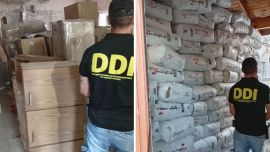The other day, passing through Madrid on my way back home to Argentina, I read a story about a young man who was tortured and then imprisoned in the Spanish capital just a few streets away from where I was living, almost half a century ago. He was held at a building which I knew, as a young journalist, was named as the Dirección General de Seguridad, or DGS, in the very centre of Madrid’s Puerta del Sol, the heartbeat of the capital,
In reality the building was the interrogation centre of Generalissimo Francisco Franco’s Secret Police, despite the dictator’s best attempts to make the Spanish capital an attractive tourist attraction. I walked past it almost every day on my way to work at the offices of Reuters, the international news agency, always suspecting there were men and women being tortured inside.
Now, many years later, Julio Pacheco is seeking justice. First for the torture he suffered in that building, over seven days and nights in August 1975, then for his imprisonment on charges of terrorism, specifically for his alleged involvement in the murder of a police officer. Señor Pacheco, now in his late 60s, makes no secret of his anti-Franco activism as a teenager. But he denies the charges brought against him back then.
I can remember all too well the shootings that might have triggered his arrest. There was a morning that August when several policemen were shot dead in and around the Puerta del Sol, all within a matter of minutes. At Reuters we heard it first from Basque militants, members of the ETA separatist movement, calling us with a code to confirm their identity, then telling us they were responsible. Then we heard it from an official at Franco’s Information Ministry, who called us to accuse the Basque “terrorists” of murder – and to warn Reuters to “identify blame, where the blame lies, con el pueblo, terroristico, vasco.” I remember watching the afternoon TV news, Telediario at three in the afternoon, the most-watched show on any day in a country that still back then had a siesta.
There was no mention that day on Telediario, such a sunny August afternoon, of the killings in Puerta del Sol – rather a report that a record number of tourists were visiting Franco’s Spain, images of women in bikinis on beaches, and males drinking beer looking at them. “La Sueca,” they celebrated in Franco’s Spain – the beautiful Swedish blonde.
Señor Pacheco, then a 19-year-old student, is seeking justice 50 years on under the present government’s ‘Democratic Memory law,’ passed in 2022, despite a 1977 amnesty law that granted immunity to those who committed crimes in Spain’s civil war in the 1930s and the subsequent decades of Franco’s dictatorship.
As I understand it, the Memory Law (from two years ago) is designed to bring “justice, repatriation and dignity” to all victims of the Civil War, presumably on both sides, and then those under Franco’s dictatorship. It seems intended to help settle “Spanish democracy’s debt to its past.” Laudable aims, I say to myself.
The memory bank is rich. I think about meeting Communist leader Marcelino Camacho, the night he left Carabanchel prison outside Madrid, a week after Franco’s death, after spending years in prison for his beliefs. I recall the sight of his wife stroking his chin as he answered our questions – an indelible memory of love and politics in the same moment.
Or spending a day with one Luis Lobato, another Communist figure. Never a star like others, Luis was just a very humble fighter for some kind of freedom, so memorable for his spirit of forgiveness and wish for unity in Spain’s future. Some 26 years in jail, again for his ideals and philosophy, but it’s his joy I recall as we walked through his neighbourhood and people shook his hand, or hugged him, in awe of his sacrifice for all of them. You felt so small in the presence of a Luis Lobato.
Half-a-century on (because come next year, dear Spain, so forever in my heart, it will be 50 years since Franco died), I was dismayed to read that a judge has effectively shelved the case of the man who could well have been tortured a few streets from where I lived in 1975. The judge spoke of the statute of limitations, and said some of the accusations made by Pacheco fell beyond the remit of the Democratic Memory law. Time to move on, that seemed to be the judge’s message.
Help me, Your Honour, but what are we talking about here? Whether they used electrodes on Señor Pacheco, or pulled out his nails? Or didn’t allow him to sleep before they attacked him again? And please, having spoken in the months following Franco’s death to those held at the Dirección General de Seguridad at the beautiful Puerta del Sol, however it was packaged back then by Franco, and has been re-packaged since, I can have few doubts about what was happening as I walked to work in the summer of that year.
After years as a correspondent elsewhere, in Africa, the Middle East and the old Soviet Union, seeing crimes against humanity writ large, I can have no doubts. There was a Gulag of sorts, a torture chamber, close to where I lived in Madrid in August 1975. And time, even decades, cannot erase the memory. Time does not move on for a Señor Pacheco. Nor should it.
But I’m not going to say we here in Argentina, where I have lived for more than a decade, have it right. I remember talking to former president Carlos Menem, as a journalist back in the 1990s, when he tried to find a way to handle the military dictatorship’s many vile crimes, and build a truth commission so the country could look honestly in the mirror at itself. I think of another interview, with Colombia’s then-president Andrés Pastrana, when he sought a path out of the quagmire created by the war with the FARC rebels and the crimes against humanity committed on all sides. There is no ‘Golden Mean’ here, no path secure, on the way out of the past, and forward to a peaceful future.
In conclusion, I reached out. expressing some dismay, to a son now living in Valencia. He told me that his partner’s grandfathers, on both sides, narrowly escaped being “fusilados” in Spain’s civil war. But he added that recently he visited one of Valencia’s memorials to those who were not so lucky. On the wall they found a plaque bearing a family name.
The family was always told that their brother, their son, their cousin had left their town mysteriously, run off with a girl maybe, and never been heard of again, only for his remains to be found in one of the country’s mass graves. My son noted: “The plaque is the closest thing he has to a tomb.” To which I heard myself saying: “We have to do better than that for Julio Pacheco.”
Because those who forget their history are condemned to repeat it, in George Santayana’s famous epithet, si? In Spain’s case, I fear those who do not confront their history are condemned to live with it.

























Comments